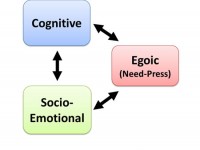Otto Laske gives you an overview of the Constructive Developmental Framework CDF and offers a few examples of how it can be used for self-awareness and personal growth. The emphasis in the video is that when we speak and relate to others, we are already embedded in a "frame of reference", and that this frame develops over the entire life span. That means that, in a way, we are sitting in a cave, without our knowing, unless we decide to explore the cave. Read More...
Tag: Introduction
How to develop collaborative intelligence?
One of the new IDM initiatives is a 'Rewiring Team Dynamics' workshop which will be organized as a three day seminar in April 2015, near Brussels/Belgium. The key question is: How can we create groups that can learn from mistakes faster, more efficiently, and more consistently than competitors do?' The background of this question is the simple observation that a lot of groups systematically under-perform. They do not make good decisions and they do not solve complex problems in a collaborative way. Traditional Team Building Traditional team building interventions, which are mainly behaviorally focused, do not seem to work when team members are highly developed (especially when they are knowledge workers). The top interventions advised from a behavioral point of view are: foster constructive debate in meetings push back when consensus forms to quickly use devil's advocate thinking look for competing explanations to challenge your observations get some distance, step away, and then try again in order to recognize and interpret complex data use visual graphs or flowcharts to juxtapose the larger picture with the individual puzzle pieces reframe situations and always examine several more options use impromptu meetings when time is limited to generate more options, including unconventional choices... Read More...
Introduction to Dialectical Thinking
5' Introductory video: Otto Laske on the transformative power of learning dialectical thinking Read More...
Introduction to the three CDF Dimensions (Self-Study)
This course introduces students to a widely acclaimed, holistic perspective on both individuals and teams. It is an overview course focused the three perspectives in which CDF-users view clients: the social-emotional, cognitive, and psychological one. Insight into these dimensions stems from decades of validated research since the 1970s but has not been widely taught in a unified fashion. In the course, emphasis is placed as well on the interrelationships between the three dimensions since they closely interact in coaching as well as consulting. Based on this course, students become eligible for all other CDF courses. Read more Read More...
Introduction to Developmental Work with Teams
This course introduces team leaders and team coaches to fundamentally new ways of understanding the nature and behavior of teams, with the goal of re-shaping team dynamics. In the course, two main processes are distinguished: interpersonal and task process. Their balance is thought to define team maturity. The purpose of the course is twofold: to change coaches’ perception of teams based on social-emotional insight, and to give them new, dialectical, dialog tools for supporting team members’ interpersonal process and for strengthening their task process. Team maturity and different modes of team leadership are central course topics. The methodology taught goes far beyond purely the behavioral approaches now used, focusing on team members’ developmentally shaped frame of reference on account of which they collaborate in the team and view the organization they art part of the way they do. Students will be asked to submit a concise description of a team they are working with; their descriptions will provide the focus around which CDF tools are introduced and practiced in class. The study cohort itself will serve as a team to practice on. Read more Read More...
Human development as individuals – from late adolescence to practical wisdom
Rainer von Leoprechting on Adult Development A 30 minutes introduction into development from late adolescence into practical wisdom. The journey of adults over a lifetime... Read More...

